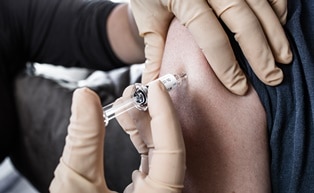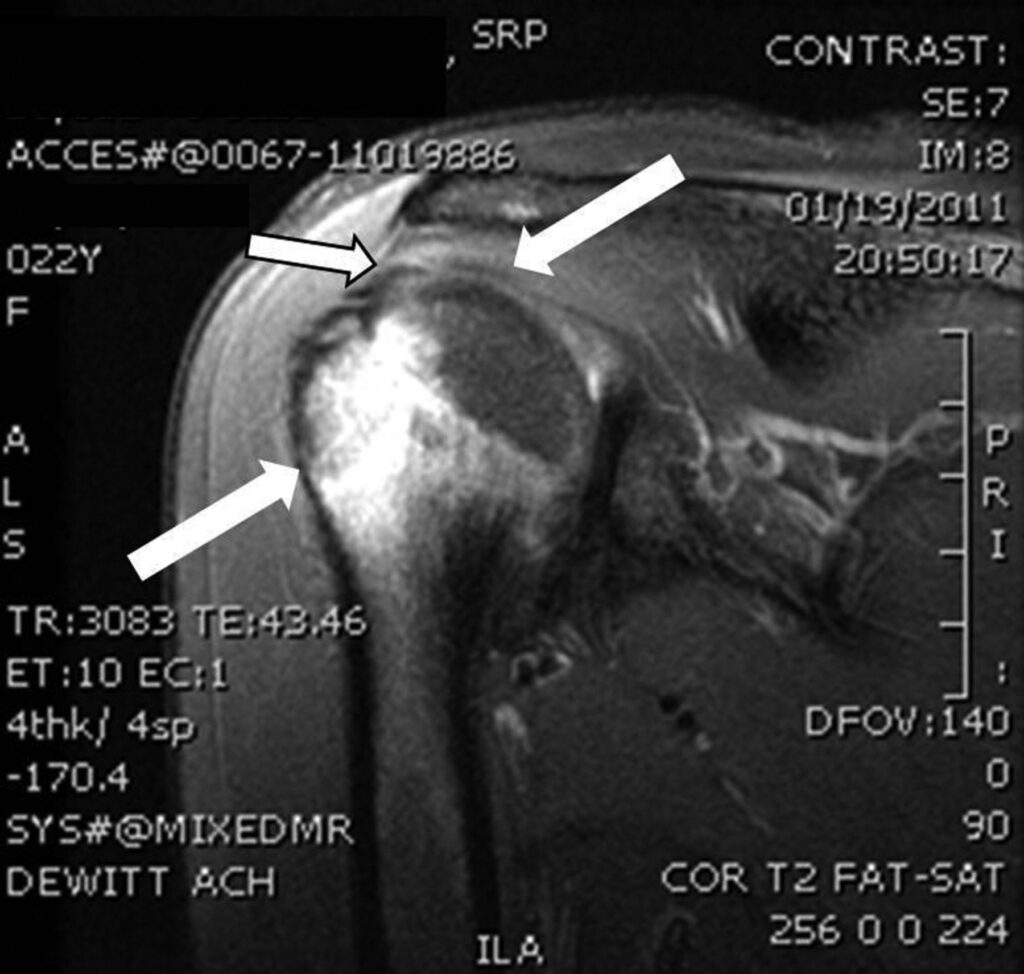Sirva Symptoms; The Centers for Disease Control and Prevention (CDC) defines SIRVA via three criteria: pain, limited range of motion, and swelling. The syndrome can be the result of a misdirected vaccine or an injection that is too forceful, or it may occur spontaneously.
Symptoms usually develop within 48 hours of receiving a vaccine, but can sometimes appear as long as a week later. In addition to pain and limited range of motion in the shoulder area, common symptoms include:
• shoulder weakness
• shoulder pain radiating down the arm
• difficulty sleeping on the affected shoulder
• severe headaches
• numbness or tingling in the arm and hand
Symptoms of an SIRVA Injury
SIRVA symptoms are very unique and can vary from person to person. The most common symptom is severe arm pain, which will be located close to the shoulder. This pain can be minor, or it can be so unbearable that you cannot even lift your arm. If the pain is too much, you may need to stay off of work and rest while taking anti-inflammatory medications. Other symptoms include radiating shoulder pain, tightness in the shoulder, a frozen shoulder that limits mobility, muscle spasms, and headaches.
Other symptoms can occur frequently such as numbness or tingling in the arm or hand. These symptoms are usually caused by nerve damage and usually happen after surgery. If you have any of these symptoms after your vaccines, you should talk to your doctor right away so they can diagnose the problem and make sure the nerve damage doesn’t get worse.
The SIRVA symptoms are similar to those of a heart attack: these include sudden onset of intense pain, accompanied by sweating, nausea, vomiting and shortness of breath. The symptoms usually begin immediately or within 3 to 4 hours of receiving the vaccine. In some cases, symptoms may not appear for up to 48 hours.
Unfortunately, there is no way of knowing whether you will have a reaction until you receive the vaccine. While it is rare, some people are more vulnerable than others to developing SIRVA symptoms. Risk factors include:
Being female
Having received the vaccine in your upper arm (rather than in your thigh)
Having had any previous injury or inflammation in your shoulder joint
We have made an attempt to list out the various symptoms of SIRVA.
Pain in the upper arm, shoulder or neck
Pain and movement limitations in the shoulder region
Difficulty sleeping on the affected side
Arm weakness/difficulty moving your arm
Tingling/Numbness in the arm, hand or fingers
Symptoms of SIRVA usually occur within 48 hours of the injection. They include:
Pain and swelling in the shoulder
Sudden, severe pain that worsens with activity or movement
Limited range of motion in the shoulder, which may become completely immobilized
Some people also experience muscle spasms, weakness in the arm, and a feeling of instability in the shoulder.
SIRVA stands for “Shoulder injury related to vaccine administration.” SIRVA is an adverse reaction to receiving a vaccination. Most SIRVA cases are reported after a patient has been vaccinated in the upper arm or shoulder.
Most people associate SIRVA with flu or shingles vaccines, as these are usually administered in the upper arm or shoulder. However, any vaccine administered in this area can cause SIRVA. This includes the meningitis (MCV4) and HPV vaccines, among others.
Symptoms of SIRVA include:
Pain in the shoulder or arm, where the injection was administered
Pain that extends down into the hand
Limited range of motion in the shoulder and arm
Muscle spasms at the injection site
Numbness or tingling in the fingers, hand or forearm
In some cases, a large lump may form at the injection site
Sirva is an acronym for Shoulder Injury Related to Vaccine Administration. This is a recently discovered complication of vaccination in adults. The most common symptom is pain, which patients report in varying degrees. Some patients have limited range of motion with pain at the extremes of motion, and others have complete loss of motion. Some patients only experience pain while moving the arm, while others have constant pain that radiates into the neck, chest and/or back. In more severe cases, some patients develop a frozen shoulder or even a rotator cuff tear as a result of their SIRVA.
How Long Does it Take For SIRVA to Go Away?

SIRVA sufferers usually report a few days of mild discomfort, but that is followed by a week or two of severe pain. The pain is often accompanied by headaches, dizziness and nausea, as well as feeling faint. Many people describe the worst headache of their life.
The symptoms of SIRVA usually subside after a few weeks, but unfortunately many sufferers are left with chronic pain. This can be debilitating, preventing them from being able to do simple things like driving a car or walking up stairs. The worst sufferers report needing assistance with daily tasks such as getting dressed and making meals.
The good news is that there are ways to manage the pain associated with SIRVA. Firstly, some doctors may prescribe muscle relaxants or anti-inflammatories to help ease the pain. Additionally, exercise programs can be beneficial for SIRVA sufferers because they help to strengthen muscles and build endurance that will in turn help mitigate the pain.
Unfortunately, for some unfortunate people, SIRVA may last a lifetime. Most people will recover completely in six months to one year. In the meantime, the pain and discomfort of SIRVA can be treated with antihistamines and other medications. Any lasting damage to nerve function caused by SIRVA is irreversible, though.
It takes a while to go away. It can take weeks, months, or even longer. In the meantime, you can use ice and over-the-counter pain relievers like ibuprofen (Advil) to help with the pain. Then, talk to your doctor about other options that might help you feel better.
What Is SIRVA?
SIRVA stands for Shoulder Injury Related to Vaccine Administration. It happens when a vaccine is given in the wrong place or at the wrong dose. This can cause pain and swelling in the shoulder area. If it’s not treated, SIRVA can lead to long-term problems like chronic pain and limited movement of your arm and shoulder.
SIRVA usually happens if a shot is given:
In a person’s upper arm instead of the upper thigh — a common mistake because those areas look alike from behind
Too high on the deltoid muscle
In the same spot on both arms within months of each other
Most people with SIRVA have a complete resolution of their symptoms within 6 months. Some people will have symptoms for longer than 6 months, but this is not common. If you continue to have symptoms for more than 6 months, it would be appropriate to see your doctor to make sure that it is indeed SIRVA and not another source of shoulder pain, as some people may have more than one problem at the same time.
SIRVA usually resolves in 3 to 6 months. Unfortunately, there are some people who have symptoms for up to 5 years after their vaccine. Here are some things that you can do to help it go away faster:
- Stop anything that might irritate your shoulder including exercises and activities that involve your shoulder.
- Try an over-the-counter anti-inflammatory like ibuprofen or naproxen sodium (Advil or Aleve). These should be fine unless you have a heart or stomach condition where these medicines are not recommended. If you are unsure, ask your doctor which medicines are safe for you to take with your existing health problems.
- Apply moist heat to the shoulder with a heating pad or hot water bottle for 20 minutes several times a day (if this increases pain, stop).
- Only use ice if it makes the pain feel better (some people don’t like ice).
- Don’t use creams or patches on your skin without checking with your doctor first since sometimes they can cause allergic reactions and other problems.
- Try relaxation techniques like deep breathing, meditation, and/or yoga.
- Physical therapy may be helpful if the pain is not getting better by itself but it’s important
SIRVA (shoulder injury related to vaccination administration) is a relatively rare complication of vaccinations, and it’s thought to affect between 1 in 1,000 and 1 in 10,000 people.
Symptoms typically appear within 48 hours of the vaccination and typically include pain, swelling, or decreased range of motion in the affected arm. In some cases these symptoms can last for months or even years.
The condition usually presents as a painful, swollen arm after vaccine administration. The immunization event should be reported to the Vaccine Adverse Event Reporting System (VAERS) within 24 hours of onset of symptoms. A precise diagnosis can be made through physical examination and imaging studies (ultrasound and MRI). If a diagnosis is confirmed, then treatment can begin immediately with pain control medications and physical therapy.
In most cases, SIRVA is a self-limiting condition that will resolve on its own without any need for intervention or treatment. However, there are some instances where surgery may be required — either to repair damaged ligaments/tendons or remove scar tissue that has formed in the shoulder joint as part of the healing process. A number of patients have reported that their symptoms were relieved after taking anti-inflammatory drugs such as ibuprofen (Ad
SIRVA is the acronym for “Shoulder Injury Related to Vaccine Administration” and is recognized as a genuine vaccine injury by the National Vaccine Injury Compensation Program. As a general rule, SIRVA is believed to be caused by improper needle technique and/or patient movement during the injection.
SIRVA can take a long time to heal if left untreated, with some cases taking years. Even with proper treatment, SIRVA can take months to heal and even a year or more in severe cases. Treating SIRVA requires several different methods. First, the patient must stop moving their shoulder around so much while it heals. Second, they must be treated with chiropractic adjustments that help realign the shoulder to its proper position. Once these two treatments are done together, most patients will find relief within 1-2 months and complete recovery by 4-6 months at most.
Does SIRVA Go Away On its Own?

If you have SIRVA, it will not go away on its own. This is a serious condition that can impact your life for months, or even years.
SIRVA may not go away on its own. If the pain is severe, it is recommended that you contact your allergist or immunologist to further assist you with your SIRVA symptoms.
If you have SIRVA and are suffering from pain, you may be eligible for compensation. You can call our SIRVA lawyers at 1-800-881-2021 for a free consultation, or fill out the form on this page to find out if your SIRVA may qualify for an allergy shot lawsuit.
SIRVA is defined as shoulder pain and/or limited range of motion following an injection. The cause of SIRVA is an immune response to the vaccine or medication injected, rather than an injury to a muscle or tendon.
Patients who present with SIRVA typically have pain and limited range of motion on their dominant arm, and sometimes have weakness in the affected arm. They sometimes report problems sleeping due to their discomfort.
The good news for patients with SIRVA is that it can be treated effectively. In most cases, treatment includes anti-inflammatory medications such as corticosteroids, over-the-counter pain medications such as ibuprofen, physical therapy and in severe cases, surgery.
SIRVA can go away on its own without any treatment but it can take weeks or months for that to happen. Patients who receive treatment report feeling better faster and having a better quality of life while they are recovering from SIRVA.
SIRVA usually gets better with time. You may have good days, but you may also have some bad days, especially when you are more active. If you have mild SIRVA symptoms (such as a little pain or soreness), your symptoms may stay the same for a long time. If your pain is severe at first, it may take longer to get better.
You can take steps to help manage your pain and feel better. For example:
Rest when you need to, but do not avoid all activity.
Avoid activities that strain the shoulder muscle and tendons, such as heavy lifting and overhead sports.
Do exercises to stretch and strengthen the muscles around your shoulder. These exercises should be gentle at first, then progress to more challenging ones as you get stronger and your pain goes away.
Use ice packs or apply heat to ease pain.
Take nonsteroidal anti-inflammatory drugs (NSAIDs) such as ibuprofen for pain relief and swelling reduction.
Talk with your doctor about other ways to help relieve your pain and discomfort.
SIRVA can resolve on its own in mild cases. If the pain is more severe, you may need to seek medical treatment.
SIRVA should go away within two weeks for most people. The pain will gradually improve over this time period as the body heals itself.
In some cases, however, SIRVA may last longer than this or become chronic. If symptoms do not improve within two weeks, it is important to see a doctor or physical therapist. A doctor can diagnose SIRVA and determine which treatment methods are best to alleviate pain and discomfort.
SIRVA will usually go away on its own, but it may take a few months. Sometimes, symptoms improve and then return.
In some cases, SIRVA can cause long-term problems. You may need to take medicine for a long time. Or you may need treatment for pain or joint damage
Still wondering if the vaccine made you sick?
If you are still not sure if the vaccine caused your illness, talk to your doctor or nurse.
In general, this is an uncommon but serious potential side effect of the flu shot. It is not something that happens to everyone who gets the shot, and it is not something that happens to everyone with the vaccine-induced shoulder injury.
If someone does get SIRVA symptoms, it is important to recognize them as soon as possible and seek medical help.
Can SIRVA Be Permanent?

Can SIRVA be permanent?
The most common question we get asked is, “Can SIRVA be permanent?” The short answer is no. The long answer is that while the pain can be managed and sometimes elminated, the sensitivity and pain may return at a later date when triggered by certain activities.
SIRVA is a condition that has both a physical cause (the injection itself) and a neurological cause (the reaction of the body to that injection). The injection inactivates bursa which can cause inflammation and swelling which in turn causes pain. However, the pain does not come from the shoulder itself but from the nerves sending signals to the brain that something is wrong in the shoulder. Because of this, pain will often continue even after all inflammation has subsided because the brain becomes sensitized to these signals.
Because of this, any activity that triggers these signals may create pain again even if you are feeling better at the time. For example, many people who have recovered from their symptoms experience a flare-up if they reach across their body or above their head too quickly. This happens because these movements stretch out muscles or tendons which in turn puts pressure on nerves which sends signals to the brain that something is wrong and prompts it to release
Question: I was vaccinated in December of last year with a flu shot. I immediately had severe pain in my shoulder followed by a burning sensation and tingling down my arm into my hand. My doctor diagnosed me with SIRVA or Shoulder Injury Related to Vaccine Administration. My symptoms have not resolved since December. Can SIRVA be permanent?
Answer: The vaccine injury known as SIRVA, or Shoulder Injury Related to Vaccine Administration, occurs when the needle used to administer the vaccine hits the bursa sac (a fluid-filled sac) in the shoulder joint, which causes inflammation and swelling of the bursa sac. This inflammation can lead to damage to tendons, ligaments, nerves and other soft tissues in the area, causing severe pain and limited mobility in that shoulder joint.
Symptoms can last for several weeks or months after receiving the vaccine. Unfortunately, there are a number of people who do not experience relief from these symptoms within that time period and may continue experiencing pain and limited range of motion in their shoulder joints for years.
Yes, SIRVA can be permanent.
If you’re experiencing shoulder pain and stiffness following a vaccination, it’s important to seek medical help right away. Your doctor will likely perform some type of diagnostic imaging such as an MRI to determine whether or not you have SIRVA. It’s important to note that the initial discomfort in your shoulder may go away after a few days, but if it doesn’t, you should still talk to your doctor about the possibility of SIRVA.
SIRVA can be permanent. The more severe the SIRVA, the more likely it will be permanent. In some cases, SIRVA has been shown to resolve after a few months. However, in other cases the symptoms of SIRVA persist for years and may never fully resolve.
SIRVA is a term coined by patient advocates to describe the symptoms that resemble carpal tunnel syndrome and/or rotator cuff tendinitis/bursitis which patients develop following a routine vaccination.
SIRVA is an acronym for Shoulder Injury related to Vaccine Administration, which was first noticed due to the increased number of claims and complaints of patients who received flu shots.
In most cases, SIRVA is temporary, but depending on the severity of the injury, some patients may experience chronic symptoms; in these cases, SIRVA can be permanent.
In the short term, yes. But in the long term, it can become a chronic condition.
SIRVA is more complex than just a pain-in-the-shoulder condition. There’s swelling, stiffness and weakness that accompany the pain. It’s important for a patient to understand that these are normal symptoms related to an abnormal event (getting injected in the wrong place). It may take three weeks or longer for these symptoms to improve. When they do, they can return again if the patient becomes overactive.
Injections administered into the bursa may eventually cause the bursa to shrink and atrophy from repeated irritation of the tissue by medication. The bursa will also begin to thicken and scar down. These changes are irreversible and can result in stiffness and decreased mobility of your shoulder region for years to come if not treated properly.
If you have SIRVA, then the mind has been tricked into thinking that the shoulder is under threat and needs protection. This can be very difficult in terms of rehabilitation. The body is very good at learning new things and adapting to its environment but it is just as good at remembering painful experiences and trying to protect itself from them reoccurring.
The mind is incredibly powerful and this becomes even more apparent when dealing with pain. Pain can be both real and imaginary, it can be perceived or can be a warning sign (painful experience) that prevents us repeating certain activities.
The longer the protective mechanism remains in place, the more difficult it can become to overcome this faulty protective mechanism and return to normal function.
